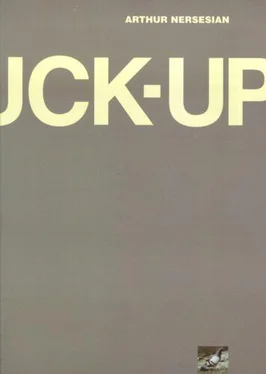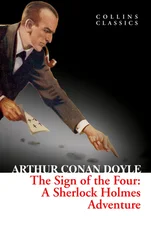Arthur Nersesian
THE FUCK-UP
I would like to thank those who helped bring this edition into print:
Patrick Nersesian
Kim Kowalski
Jennifer Belle
John Talbot
Laurie Horowitz
Zeke Weiner
Greer Kessel Hendricks
Eduardo Braniff
Kristen Harris

Perhapsthe price of comfort is that life passes more rapidly. But for anyone who has lived in uneasiness, even for a short, memorable duration, it’s a trade-off that will gladly be made. When I was in my teens, Imade an appraisal of how comfortable my life could turn out when I became the age I am now. Because of a mechanical failure, the prediction was inexact. Things reversed. I ended up living somewhere I once avoided, with a woman whom I genuinely once disliked.
Recently we celebrated our seventh anniversary together with a decent dinner and a not dreadful film. I got out of work early that evening and took the F train to Forty-second Street. I crossed Fifth Avenue toward the Main Branch of the Public Library, but paused in the middle of the crosswalk. It was filling up with the evening rush hour crowd: men in trench coats, secretaries in tennis shoes, cabs in the crosswalk, cars honking, leviathan buses zooming inches, braking, zooming again, and bike messengers slicing through it all. The last time I was in that spot, seven years ago, there wasn’t a person in sight.
Seven years ago that day, as dawn rose, I remember standing in roughly the same spot watching as the traffic signals hanging over each intersection slowly turned yellow then red. Cars zoomed forward, headlights still on, staying ahead of the changing lights; at dusk they could make it all the way down without a single red light.
At rush hour, the entire avenue was gridlocked. But I could still faintly make out the small white crown of the Washington Square Arch at the very end. The anniversary of my relationship coincided with that dawning, and although that morning marked something that eluded celebration, it couldn’t be forgotten either.
Something honked at me, so I crossed the street, reboarded the packed F train, and returned to Brooklyn for the anniversary dinner.
Before I got canned from my first job, back in the early eighties, I had relations with a waitress who subsequently became a girlfriend. I was a prep cook, at one of those West Village singles dives, and I think the boss was jealous over Sarah; she was one of the last waitresses there whom he hadn’t screwed. She lived in the East Village, near the Saint Mark’s Cinema, which is currently the site for the Gap. Soon after my dismissal from my prep cook job, I moved in with her. It was about a week after my new-found residency, while passing the Saint Mark’s Cinema, that I noticed a sign written in a distressingly angular cursive. It read: “WE NEAD USHER!” I entered the theater and had a quick dialogue with Stan, the manager on duty, who hired me on the spot and wanted me to start that evening.
The only lasting memory of that virgin shift was the ejection of a wino. Pepe, the owner, quickly pointed to a bum as he was barging through the back door. Trying to impress the boss on the first day, I ran toward him and unintentionally locked elbows; we swung about in a one-hundred-and-eighty-degree turn, as if in a square dance. When I broke loose, he propelled himself back out into the night with his own momentum. After the incident occurred, Pepe embarrassed me by mentioning that while we were spinning around he couldn’t tell who was who. The derelict possessed my basic features: my age—twenty-two; my height—five feet, ten inches; and my weight—a hundred and fifty-five pounds. By the time the first year of ushering had come to a close, I was the longest surviving employee. Pepe had fired everyone.
One night, toward the end of that summer, for want of anything better to do, I jotted down a misconduct list composed of all that I had witnessed there: seven reported pocket-pickings, four robberies, one slashing (it barely broke the skin), and a pistol drawn (it wasn’t fired). I couldn’t begin to count the unnatural acts and unreported molestations. Despite these offenses, the most heinous crime in the myopic eyes of Pepe was smoking.
I took as many weekday matinee shifts as possible. These we called “lawnchair shifts” because the audience was largely composed of neglected old folks who took advantage of the pre-five o’clock senior-citizen rates. At the opening of the shift, each usher was issued a flashlight, and since we weren’t allowed to leave the auditorium—that was what Pepe called the theater—I’d read by flashlight.
So that was my day: opening the theater with the manager, helping the geriatrics into their fold-out seats, starting the film, making sure the image was good and that no one was smoking or being too enthusiastic. Then I would read. During the intermission I would mop the lobby, clean out the ashtrays, tour the aisles—politely awakening all the dozing grandparents just to make sure they hadn’t died—and when the film started, I would read again. Only once did I try to wake someone up and fail. He was a nice old guy that would shake a lot, and it seemed sad that his long life had come to an end in the middle of Turk 182. After a year, I had read The Education of Henry Adams, The Autobiography of Lincoln Steffens, and the first four books of Remembrance of Things Past, all with the films of 1982 as a backdrop. I didn’t even realize how much subconscious seepage had occurred until some time later when I was watching a rerun of On Golden Pond —I kept conjuring up strange images of young Henry Adams studying in Heidelberg.
The Saint Mark’s was a second-run house. The patrons were basically from the neighborhood, and so were the employees. When Pepe first took over the theater in the early seventies, the neighborhood was different; it was rougher but things were cheaper. By ‘82, the East Village, at least as far east as Second Avenue, where the theater was located, had become gentrified.
Perhaps because the neighborhood was becoming ritzier and Pepe was elevating the performance standard, or perhaps because one gets disgusted with minimum wage quickly, there was a large turnover rate. After two months, enough Angels were fired to populate a heaven. Two Jesuses were also dismissed: one was apparently too “brusque,” the other was “obtuse,” according to the ever idiosyncratic Pepe. When someone was fired for an Anglican reason, he was usually fired by Pepe. He did most of the firing, and I always wondered where he got his language. Then one Sunday I watched “Masterpiece Theatre” and heard Alec Guinness call someone “opaque.” The next day, someone else was fired with the same word. No one ever knew what the words meant and they were either too proud or too lazy to look them up, so they submitted quickly and retreated back eastward.
By the close of my first year at the theater, Pepe had slowly replaced the Puerto Rican locals with NYU students. It was during the NYU drive that a freshman from the film school was hired. Her name was Eunice. Like me she was from the Midwest, I think Indiana—and I was in love. She was from the America beyond the oceanic Hudson. She had apple cheeks and spoke with a twang. Sarah, on the other hand, was strictly New York, right down to her Eastern European via Lower East Side roots. Eunice was accommodating; she would laugh at my jokes, or smile when she caught me staring at her. She was a Red Delicious transformed into an Ivory Snow girl. She had a natural innocence, a kind of perpetual virgin quality, as if she didn’t know of the demon genitals that secretly dwell between the legs of all, waiting to spring.
Читать дальше













